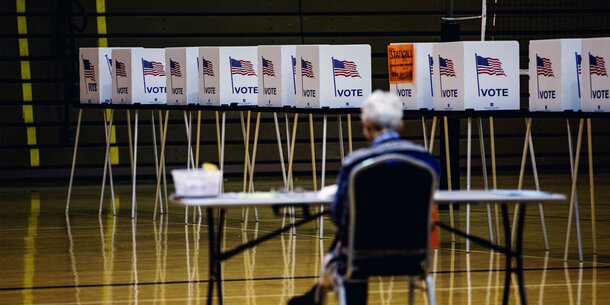As the coronavirus pandemic continues, election administrators across the country are moving to expand mail voting options for upcoming votes. For example, Iowa has begun sending absentee ballot request forms for the June primary to active voters.
This policy will make it easier for voters to cast a ballot by mail, but improper voter roll purges mean that not all voters will receive a ballot request form. That’s because in Iowa, people with past convictions aren’t allowed to vote, and until this year, the state used error-riddled conviction data for kicking eligible voters off the rolls.
Although the state has adopted a plan to reduce the risk of future errors, it does not have a plan to notify and assist voters who were erroneously removed.
Iowa’s mistakes are part of a larger story: purges based on faulty criminal history data continue to threaten eligible voters nationwide. In 2000, for example, Florida election officials removed thousands of voters from the rolls based on an error-filled list of voters who were supposedly ineligible due to felony convictions. Alarmingly, one study found that Florida’s list contained mistakes that disproportionately targeted African-American voters for removal from the rolls. Some Florida election administrators even refused to use the list because of its extreme inaccuracies. Six years later, Arkansas incorrectly flagged almost 4,000 voters for removal from the rolls due to a felony conviction — yet not one individual had been convicted of a felony.
The stakes in Iowa are especially high because it is the last state in the country with a policy of permanently and categorically banning those with past convictions from voting. If it is going to maintain such a draconian policy, Iowa has a special responsibility to administer it in a way that doesn’t also ensnare eligible voters.
Last year, a Des Moines Register investigation revealed serious flaws in Iowa’s database of individuals with felony convictions who were barred from voting. According to the investigation, some voters removed from the rolls had actually not been convicted of felonies. Some Iowans reported never receiving a notification that they were kicked off the rolls.
Those problems bumped up against federal and state law. The National Voter Registration Act (also known as the “motor voter” law) regulates how states manage their voter registration rolls. For example, it requires states to maintain “accurate and current” rolls and mandates that any activities that states conduct to remove voters must be “uniform [and] nondiscriminatory.” Furthermore, Iowa law requires a voter whose registration is cancelled because of a felony conviction be given notice, which should have provided yet another layer of protection.
Three main problematic policies contributed to the removal of eligible voters in Iowa. First, bad data that misidentified felony convictions was making its way from the courts to county election officials. One official summed up this process as a “garbage in, garbage out” approach, but insisted that the secretary of state’s office was just a “pass through,” and therefore not responsible.
Second, the state was taking a decentralized approach — asking county officials to identify and correct errors arising from state lists — instead of stemming the flow of inaccurate information from the sources.
And third, counties were using weak criteria to compare those who had reportedly committed felonies with the list of eligible voters, resulting in false positive matches. The secretary of state’s office even acknowledged to county auditors that these matches were based on “minimal information,” such as a voter’s first name and date of birth. When limited criteria are used, there is a risk the match may be inaccurate and result in the wrongful removal of an eligible voter from the rolls.
After months of advocacy, thanks in part to the League of Women Voters of Iowa, Secretary of State Paul Pate introduced a strategy and adopted an administrative rule aimed at ensuring these errors don’t happen again. County registrars are now required to send a notice of removal to a voter’s address by forwardable mail, which will hopefully make the notice more likely to get into the voter’s hands.
He also adopted a rule governing the purge process. It requires his office to review a conviction record and determine that a crime was in fact a felony before adding an individual to the list of those to be removed and passing on the information to county election officials.
Pate also committed to review all past cases before Election Day this November and confirm whether those who have been disenfranchised were properly removed from the rolls.
Although these are good initial steps, there are additional improvements that the secretary’s office should implement to ensure that faulty criminal history data doesn’t result in wrongfully purged voters.
First, Iowa should use stronger matching criteria. The new rule simply requires county registrars to review potential matches based on four criteria, but does not actually require these administrators to match the first name, last name, date of birth, and social security number of a voter with a felony conviction to the same criteria found in the state’s voter registration database. If election officials continue to use weak matching criteria, eligible voters can again get caught up in these purges.
Second, Pate should provide notice to all those who were erroneously removed in the past and help them to re-register. He has committed to the time-intensive review of thousands of cases and should take the relatively minimal next steps to fix any mistakes that the office identifies during the coming months. Without providing notice and an opportunity to re-register for voters, eligible voters who were purged improperly will not receive an absentee ballot request form for the upcoming state primary and may be disenfranchised.
Further, as Iowa moves to expand absentee voting, the state should proactively provide absentee ballot request forms to both active and inactive voters to ensure those erroneously removed have an opportunity to request and cast a ballot that counts this June.
Iowa already has Election Day registration and individuals who aren’t on the rolls may cast provisional ballots at the polls. Iowa should ensure that there are fail-safe options that allow people who were erroneously purged to vote, including to cast their ballots by mail. Indeed, this is something that every state should do.



